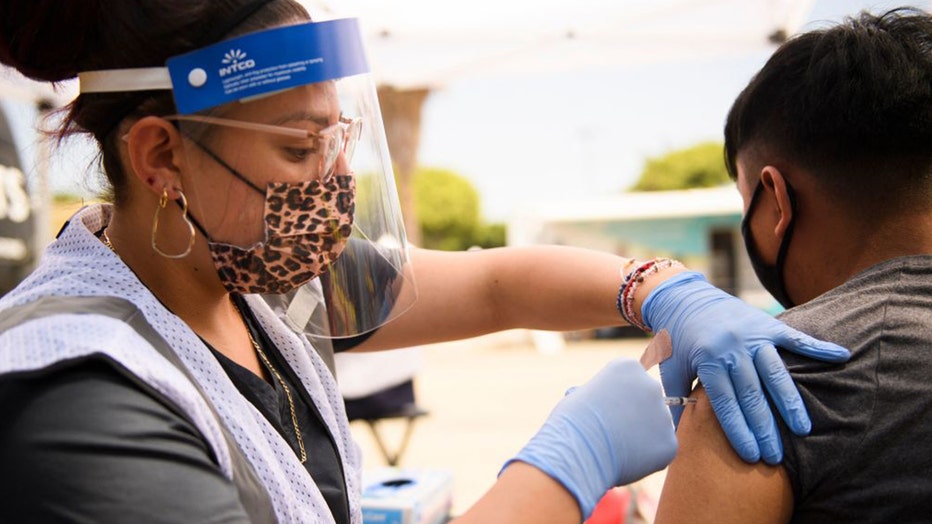Chances of heart inflammation after COVID-19 vaccine are slim, study finds
A recent study published in the journal JAMA on Aug. 4 found that the chances of developing heart inflammation after receiving the COVID-19 vaccine were minimal and the complications were short-lived.
Evidence of temporary heart inflammation after receiving a COVID-19 vaccine was reported in mostly adolescent males ages 16 or older and it happened more frequently after patients received their second dose, according to the U.S. Centers for Disease Control and Prevention.
"Myocarditis is inflammation of the heart muscle, and pericarditis is inflammation of the outer lining of the heart. In both cases, the body’s immune system causes inflammation in response to an infection or some other trigger," according to the CDC’s website.
Authors of the JAMA study observed just over 2 million patients who received either just one dose or two doses of the COVID-19 vaccine through the Providence health care system.

FILE - A 17-year-old receives a first dose of the Pfizer COVID-19 vaccine at a mobile vaccination clinic during a back-to-school event.
RELATED: COVID-19 vaccine may cause heart inflammation in teens, reports find
"Twenty individuals had vaccine-related myocarditis (1.0 [95% CI, 0.61-1.54] per 100,000) and 37 had pericarditis (1.8 [95% CI, 1.30-2.55] per 100,000)," the study said.
Patients who developed heart inflammation complications were hospitalized for an average of two days and discharged with no further complications, according to the study.
"The key point from the study is, to put the hazard in perspective, the risk of being struck by lightning is roughly one in 15,000. Myocarditis is almost 10x rarer. If people are worried about these adverse effects after vaccination, then they shouldn’t be stepping outside the house because of the risk of being struck by lightning," a Providence spokesperson told FOX TV Stations.
In late June, federal officials and health experts announced plans to strengthen cautions about the rare heart inflammation complications for teens and young adults, however, emphasized the benefits of getting the COVID-19 vaccine far outweigh the risks.
RELATED: Pediatricians warn of 'pressing risk' among children as delta variant spreads
"The facts are clear: this is an extremely rare side effect, and only an exceedingly small number of people will experience it after vaccination. Importantly, for the young people who do, most cases are mild, and individuals recover often on their own or with minimal treatment," according to a joint statement made by top U.S. government health officials, medical organizations, laboratory and hospital associations.
Meanwhile, the COVID-19 outbreak in the U.S. crossed 100,000 new confirmed daily infections Aug. 7, a milestone last exceeded during the winter surge and driven by the highly transmissible delta variant and low vaccination rates in the South.
Health officials fear that cases, hospitalizations and deaths will continue to soar if more Americans don’t embrace the vaccine. Nationwide, 50% of residents are fully vaccinated and more than 70% of adults have received at least one dose.
It took the U.S. about nine months to cross 100,000 average daily cases in November 2020 before peaking at about 250,000 in early January 2021. Cases bottomed out in June, averaging about 11,000 per day, but six weeks later the numbers are again over 100,000.
RELATED: Cholesterol drug cuts coronavirus infection by 70%, researchers find
Hospitalizations and deaths are also increasing, though all are still below peaks seen early this year before vaccines became widely available. More than 44,000 Americans are currently hospitalized with COVID-19, according to the CDC, up 30% in a week and nearly four times the number in June. More than 120,000 were hospitalized in January.
The seven-day average for deaths rose from about 270 deaths per day two weeks ago to nearly 500 a day as of Friday, according to Johns Hopkins University. Deaths peaked at 3,500 per day in January. Deaths usually lag behind hospitalizations as the disease normally takes a few weeks to kill.
On Sunday, Dr. Anthony Fauci, the U.S. government's top infectious disease expert, said that he was hopeful the Food and Drug Administration will give full approval to the coronavirus vaccine by month's end and predicted the potential move will spur a wave of vaccine mandates in the private sector as well as schools and universities.
The FDA has only granted emergency-use approval of the Pfizer, Moderna and Johnson & Johnson vaccines, but the agency is expected to soon give full approval to Pfizer.
RELATED: Unvaccinated Americans not changing their views, behavior on COVID-19 pandemic, study finds
"I hope — I don’t predict — I hope that it will be within the next few weeks. I hope it’s within the month of August," Fauci said of FDA approval of the vaccine. "If that’s the case, you’re going to see the empowerment of local enterprises, giving mandates that could be colleges, universities, places of business, a whole variety and I strongly support that. The time has come. ... We’ve got to go the extra step to get people vaccinated."
The Associated Press contributed to this report.

